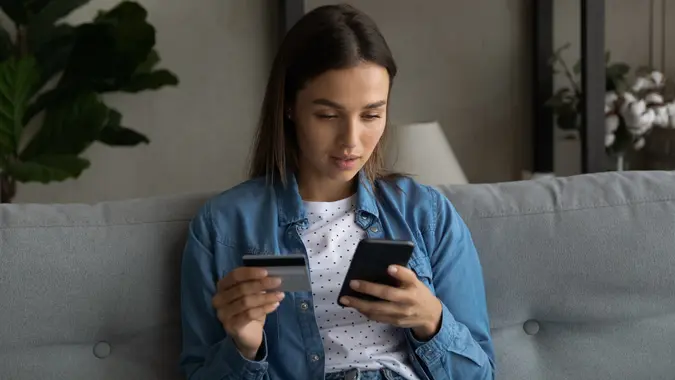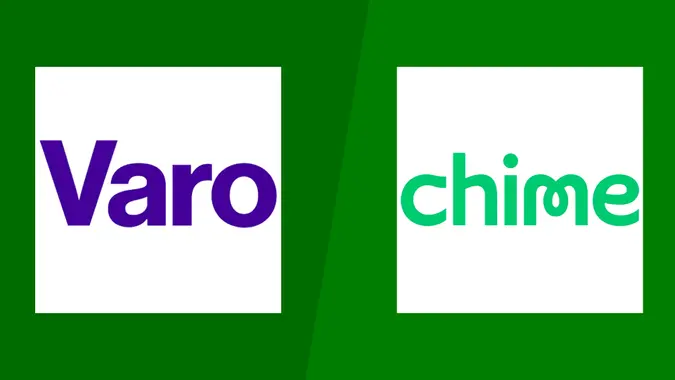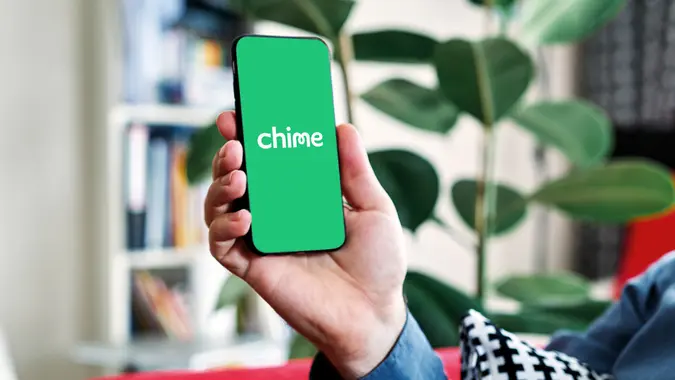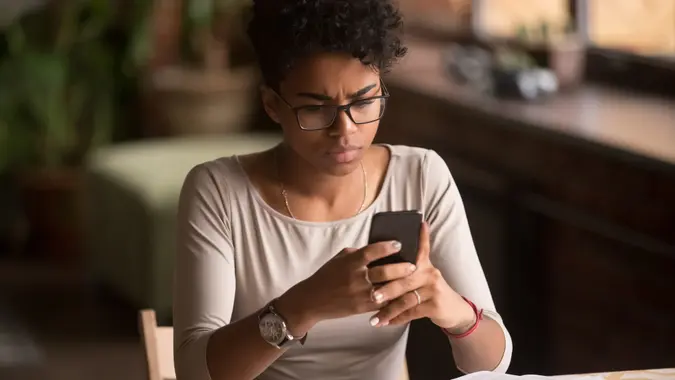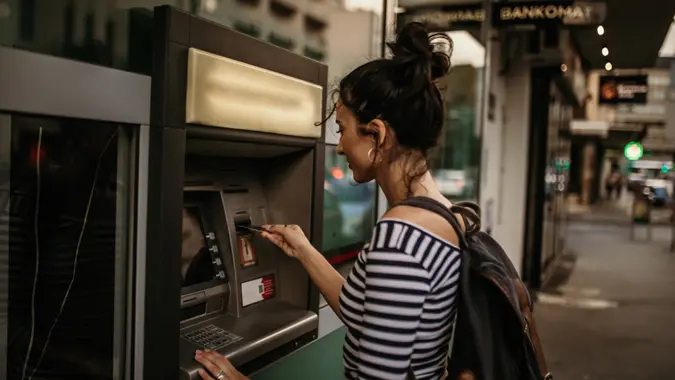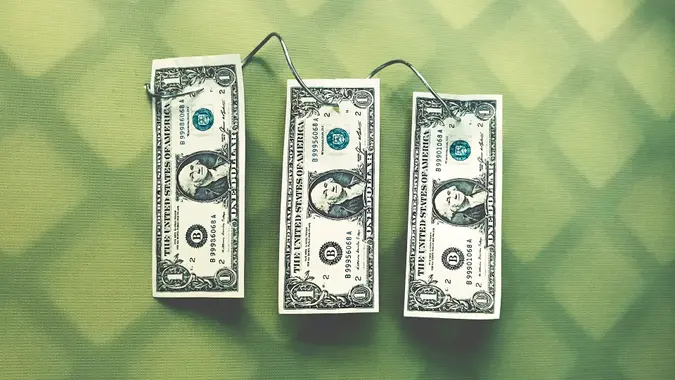What Is a Digital Wallet and How Do They Work?

Commitment to Our Readers
GOBankingRates' editorial team is committed to bringing you unbiased reviews and information. We use data-driven methodologies to evaluate financial products and services - our reviews and ratings are not influenced by advertisers. You can read more about our editorial guidelines and our products and services review methodology.

20 Years
Helping You Live Richer

Reviewed
by Experts

Trusted by
Millions of Readers
A digital wallet is a cashless payment system that stores your payment information and allows you to make transactions through your devices, without swiping a debit or credit card.
These systems are also called e-wallets, electronic wallets or mobile wallets. You can use them through your mobile device, and they can also be stored on your laptop or desktop computer.
How Digital Wallets Work
Unlike the wallet you carry in your purse or pocket, this digital version holds your credit card information without needing the physical card itself. The mobile app on your phone securely stores information about your payment methods and other items you might keep in your physical wallet.
Besides your bank account and credit and debit cards, you may also store your ID, loyalty cards, coupons or airplane tickets you’ve purchased.
To buy something at checkout, the system instantly takes the payment from your linked bank account, debit card or credit card, depending on your default payment choice.
With modern technology and conveniences, it has never been easier to spend your money. You can even leave the house without your wallet or purse and still be able to go into many stores and purchase items with just the touch of your phone.
Types of Digital Wallets
The three main types of digital wallets are closed, semi-closed and open.
- Closed: Closed wallets, like Amazon Pay, are for use only with a particular store or website.
- Semi-closed: Semi-closed wallets like Apple Pay and Google Pay let you shop online and offline with a select group of merchants that accept that particular wallet.
- Open: Open wallets let you make payments with just about any merchant, as well as transfer money between other users of the same app and perform banking tasks like ATM withdrawals.
How To Set Up and Use a Digital Wallet
Setting up a digital wallet is simple. You can follow these steps:
- Choose your digital wallet: Most smartphones come with a built-in digital wallet but you can also download third-party digital wallets from your app store.
- Add a payment method: Open your digital wallet app and select “Add a Payment Method” or a similar option. Follow the prompts to add your credit card, debit card or bank account details.
- Set up security features: Enable biometric authentication, a PIN code or two-factor authentication for extra security layers.
- Start using your digital wallet: Your wallet is set up and ready to be used for ATM withdrawals, in-store purchases, online payments and more.
Benefits of Using a Digital Wallet
Here are some benefits of using digital wallets:
- Fast and convenient: Pay instantly in stores, online or in apps.
- Secure transactions: Uses encryption, tokenization and biometric authentication to keep your accounts safe.
- Less reliance on cards and cash: Store multiple payment methods in one place.
- Earn rewards: Automatically apply cash back, discounts and loyalty perks.
Popular Digital Wallets Compared
Many phones and devices come already equipped with a digital wallet, but if you’re not interested in using the pre-downloaded version, you can opt for a different one. The following are examples of where you can find user-friendly wallets:
- Apple Pay: Lets Apple users make purchases and send and receive cash. About half of U.S. retail establishments accept Apple Pay.
- Google Pay: Is compatible with many popular retailers, as well as DoorDash and other services.
- Samsung Pay: Can be used for nearly any merchant, because it works with credit card readers.
- PayPal: Is used most often for person-to-person payments but is also widely accepted by online merchants. Instant Transfer from a linked debit card incurs a fee.
- Venmo: Is mostly for person-to-person payments between people who have the wallet installed on their devices, but a small number of retailers — mostly online — accept it, as well.
Conclusion
Before using a digital wallet, you should take precautions to protect the information you have stored electronically. Take advantage of your smartphone’s built-in safeguards like biometric access from the lock screen. The phone will ask for your fingerprint or scan your face before opening, which helps prevent fraudulent activity.
FAQ
Here are the answers to some common questions about digital wallets.- What do digital wallets do?
- A digital wallet stores your payment information -- like your credit card, debit card or bank account -- so that you can use it to pay for purchases instead of using your physical card. Some digital wallets also enable person to person payments, so you can easily send money to friends and family.
- Are digital wallets safe?
- Yes, with digital wallets your account information is encrypted and available only to people with a password. Many smart devices come with biometric authentication that you can enable for your digital wallet, so it needs your fingerprint or facial recognition to open the app. You can also lock the digital wallet remotely if you suspect someone has accessed your bank accounts.
- Can digital wallets store multiple payment methods?
- Yes, you can add multiple credit cards, debit cards and bank accounts.
- Do all stores accept digital wallets?
- Digital wallets are widely accepted, and you'll know a store merchant accepts your digital wallet if you see its logo or the contactless symbol -- which looks like a Wi-Fi symbol turned on its side -- at the register.
- How do digital wallets compare to traditional credit cards?
- Digital wallets offer faster, more secure transactions and can store multiple cards in one place.
- What happens if I lose my phone with a digital wallet?
- You can lock or erase your wallet remotely to keep your payment details safe.
Alicia Bodine and Daria Uhlig contributed to the reporting for this article.
Our in-house research team and on-site financial experts work together to create content that’s accurate, impartial, and up to date. We fact-check every single statistic, quote and fact using trusted primary resources to make sure the information we provide is correct. You can learn more about GOBankingRates’ processes and standards in our editorial policy.
- Corporate Finance Institute. 2022. "Digital Wallet."
- TechRadar. 2023. "Best mobile payment apps of 2023."
 Written by
Written by  Edited by
Edited by 





